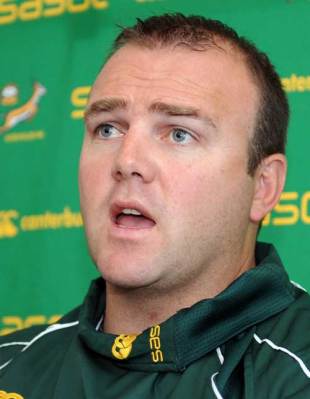|
Super 14
SANZAR announces Super 14 expansion
Scrum.com
May 19, 2009

SANZAR CEO Andy Marinos has announced the future structure of Super Rugby
© Getty Images
Enlarge
SANZAR has announced the details of the future of Super Rugby, with the tournament set to stretch from the last weekend in February to the first weekend of August from 2011 and incorporate a15th side, from Australia. The 24-week tournament will provide each side with at least eight home games and also introduces a new "sudden death" qualifying round before the semi-finals. The 15 sides will be divided in to three national conferences, playing the other four sides in their conference home and away and playing four out of the five sides from the other conferences. The three confenrece winners and three 'wildcard' sides with the most points will advance to the playoffs, where the wildcard sides and the conference winners with the lowest amount of points will play for places in the semi-finals against the remaining conference winners. The new format will be presented to broadcasters next month, with the current TV rights deal set to expire at the end of the 2010 season. All teams will have a three-week bye during the June Test window while the Tri-Nations has been moved in the calendar and will start after the conclusion of the "Super 15". Negotiations over the future of Super Rugby dragged on for over a year before last week's announcement of a solution, leaving doubts over the future of a SANZAR competition outside of the Tri-Nations. Australia and New Zealand had reportedly discussed an alternative Trans-Tasman competition for 2011, while South Africa had reputedly made plans for an exit strategy in the northern hemisphere in order to safeguard their domestic Currie Cup competition "It has been an intense negotiation but we believe the outcome is a very good one for rugby, for the SANZAR alliance, for our players and fans and for broadcasters," said Andy Marinos, the CEO of SANZAR. "We were all committed to an expanded tournament and have been able to make it work, taking into account the different landscapes of our domestic game. What we have agreed upon is a competition with added domestic interest and a compelling international component that will see Super Rugby retain its status as rugby's toughest provincial competition." The demand for a longer Super Rugby competition was particularly strong in Australia, where there is no domestic competition as with the Currie Cup and the New Zealand Cup. Australian chiefs are also faced with huge competition from Aussie Rules, rugby league and cricket. "From an Australian perspective, having a presence in the marketplace from February to August delivers us the capacity to compete with the other codes from a stronger and more compelling position," said Australian Rugby Union Managing Director and CEO John O'Neill. "Australia is the only country in the world where four football codes compete head to head. Expanding the Super Rugby season presents us with a wonderful opportunity to further increase the profile and popularity of our game - and in the long term that will benefit SANZAR and the game worldwide." Hurricanes mentor Colin Cooper was over joyed that Super Rugby would be continuing with South African involvement and believed that the new structure would benefit the All Blacks in the long term. "Once professionalism came in, whether we like it or not, money was going to dictate," Cooper said. "Super rugby is where the money is, it's where the opportunity for players is. Super rugby will hold players in New Zealand. It's better for the players that they play in two teams, they don't play in three. Rather than jumping from one competition, going into another and getting fatigued, there will now be a decent rest time. "Hence it will be better for the All Blacks. And it'll give the respect that the Air NZ Cup deserves, it will become semi-professional because you're not going to have All Blacks in it." All Blacks fullback Mils Muliaina was also full of praise for the new structure, which will allow international players a longer break before the season and will keep alive the derby fixtures in the conference games. "I know 24 weeks sounds pretty long but there is a late start and a three-week break. You don't travel as much either, which I'm pretty happy about," the 68-test veteran said. "Starting a bit later ... that's going to be a big motivating factor for a lot of players. To play your conference (games) home and away - it is your Air NZ Cup in a little way." Key features of the proposed new SANZAR landscape are:
* A 15th team playing in the Australian conference will be added to Super Rugby following a tender process open to all territories, and with SANZAR making the decision on the new side's location. A timetable for tenders will be released shortly to ensure adequate lead-in time is provided to the successful bidder; © Scrum.com
|
Live Sports
Communication error please reload the page.
-
Football
-
Cricket
-
Rugby
-
- Days
- Hrs
- Mins
- Secs
F1 - Abu Dhabi GP
Abu Dhabi Grand Prix December 11-131. Max Verstappen ()
2. Valtteri Bottas (Mercedes)
3. Lewis Hamilton (Mercedes)
4. Alexander Albon ()
5. Lando Norris ()
6. Carlos Sainz Jr ()
-
ESPNOtherLive >>
Darts - Premier League
Golf - Houston Open
Snooker - China Open
Tennis - Miami Open

